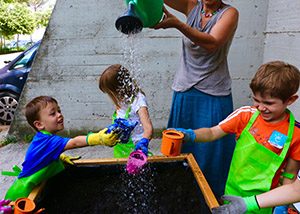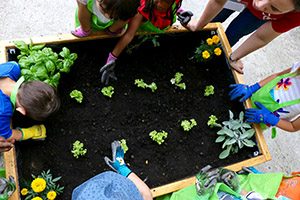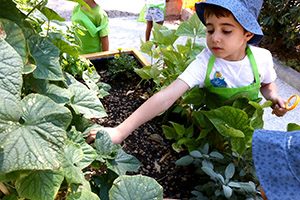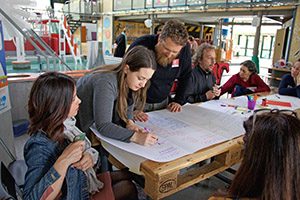Inclusive Gardening
By Alessandra Arcella, Explora, the Children’s Museum of Rome
GARDENStoGROW Urban Horticulture for Innovative and Inclusive Early Childhood Education
Explora, the Children’s Museum of Rome (il Museo dei bambini di Roma), is a nonprofit museum entirely conceived for children, schools, and families located in Rome, Italy. It was established with a mission to encourage and help every child’s natural desire to learn, through stimulating, entertaining programs for children of all ages. Additionally, our educational purpose is enhanced by workshops and classes for a large number of school teachers each year.
 Over the years our museum, an institution accredited for training by Italy’s Ministry of Education (prot.n°1.153 del 28/7/2006 D.M. n° 90/2003), has adopted an important role in the childhood educational and cultural overview. Visits by families and schools to our exhibits are enriched by thematic labs offering the possibility to learn science, technology, and art as a result of a rich schedule of changing programs.
Over the years our museum, an institution accredited for training by Italy’s Ministry of Education (prot.n°1.153 del 28/7/2006 D.M. n° 90/2003), has adopted an important role in the childhood educational and cultural overview. Visits by families and schools to our exhibits are enriched by thematic labs offering the possibility to learn science, technology, and art as a result of a rich schedule of changing programs.
Explora is leader of GARDENStoGROW Urban Horticulture for Innovative and Inclusive Early Childhood Education, a project co-funded by the European Union’s Erasmus+ program. GARDENStoGROW aims to create educational gardens and training courses for early childhood teachers and school managers to develop basic, civic, and transversal skills for the 3–6 age group. The project has been created because the improvement of education in the earliest stages of development can reduce disparities and inequalities at their roots, with a considerable socio-economic return in later years.
 School gardens are spreading all over Europe, as natural places where children can
School gardens are spreading all over Europe, as natural places where children can
- have real contact with nature
- discover the origin of their food
- observe flowers and vegetables growing
- experiment with natural growth
- learn life skills such as responsibility, cooperation, and self-confidence through achieving.
However, the permanent exploration of school gardens is often difficult to achieve due to several factors, including: unsuitable school location (land availability or contamination), difficulty accessing water, lack of funds, access and maintenance limitation during school holidays, and lack of specialized teachers or personnel for permanent and expert garden care besides pedagogical activities.
 The project encourages the adoption of innovative and inclusive pedagogical practices at the preschool level, based on urban and social horticulture, through a series of outputs and a flexible and open training program, so that early childhood education and care teachers can transform gardening into inclusive and effective educational activities for the development and acquisition of transversal, social, civic and intercultural competences.
The project encourages the adoption of innovative and inclusive pedagogical practices at the preschool level, based on urban and social horticulture, through a series of outputs and a flexible and open training program, so that early childhood education and care teachers can transform gardening into inclusive and effective educational activities for the development and acquisition of transversal, social, civic and intercultural competences.
Gardens created within the GARDENStoGROW project will allow children from different backgrounds to participate in an inclusive learning environment, with no kind of discrimination, enhancing the access, participation, and learning performance of disadvantaged learners.
 GARDENStoGROW also aims to strengthen the teaching profession, by making the careers of teachers and school leaders more attractive through a European opportunity; supporting teachers in dealing with diversity in the classroom (including pupils with a migrant background), through hands-on and informal activities based on horticulture; supporting educators in adopting collaborative and innovative practices; and strengthening leadership in education, through an active involvement from the school leaders.
GARDENStoGROW also aims to strengthen the teaching profession, by making the careers of teachers and school leaders more attractive through a European opportunity; supporting teachers in dealing with diversity in the classroom (including pupils with a migrant background), through hands-on and informal activities based on horticulture; supporting educators in adopting collaborative and innovative practices; and strengthening leadership in education, through an active involvement from the school leaders.
More information: www.gardenstogrow.eu

